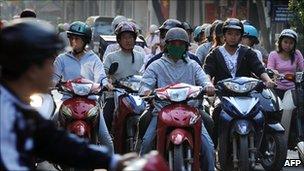Protests rise as Vietnam social unrest simmers
- Published
There are signs of growing social unrest in Vietnam after a spate of public protests over perceived corruption and economic injustices, reports the BBC's Nga Pham in Hanoi.

Nguyen Van Khuong was stopped by police for failing to wear a motorcycle helmet
Residents of Bac Giang in north-east Vietnam had never seen anything like the angry mob that choked the city's streets late last month.
Thousands of people blocked the city centre for the entire afternoon. At the head of the protest was a coffin adorned with white-flower wreaths and a picture of a young man, Nguyen Van Khuong, who had died a day earlier in police custody.
A video clip posted on YouTube showed a large group of men smash through the gate of the municipal People's Committee and hurl stones and rocks at the police.
Security forces tried to disperse the crowd with tear gas and batons but the protesters only withdrew after the city's leaders came to negotiate with the family of the deceased man.
"The police killed my relative Nguyen Van Khuong, there is no doubt of it," said one member of the victim's family.
Mr Khuong, 21, was stopped by traffic police in Bac Giang on 23 July for not wearing his motorcycle helmet and taken in for questioning.
His girlfriend waited outside for more than an hour before being told that Mr Khuong had fallen ill and had been taken to hospital. When she arrived there, she was told he had passed away.
"They just returned the body and did not provide any explanation, that's why we are so upset and decided to take his body to the People's Committee to demand [an explanation]," said Mr Khuong's relative.
Only last week, more than 10 days after the incident, a local policeman was arrested on suspicion of causing the young man's death but the official media have not provided details on how it happened.
Public anger
Nguyen Van Khuong's case is the latest in a series of clashes between residents and local authorities.
In May, an incident in Thanh Hoa province ended with two civilian fatalities. A 45-year-old man and a 12-year-old boy were shot when police tried to disperse a crowd protesting against a government industrial project.
Dozens of people were arrested just weeks earlier in a Catholic commune in Danang during a rally by hundreds of residents against land confiscation.
According to statistics released by the Government Inspectorate, during the past five years there were nearly 4,000 cases of public protest, 550 of which attracted more than 50 people.
Although the main reasons for public grievance remain land policies, other causes include corruption and official wrongdoing.
"The Vietnamese people are in general kind and peace-loving, they never want to cause trouble," say Prof Tuong Lai, a leading sociologist in Vietnam.
"They only protest when they have been pressed to the point of explosion. Like we say in Vietnamese: the dyke breaks when the flood water is too strong.
"I don't believe they have been agitated by 'foreign reactionary forces' or 'extremist elements'," he says.
Transparency needed
Prof Tuong Lai says the increasing regularity of public protests indicates "serious problems in society" that need special attention from the leadership.
"The Communist Party and the central government should make efforts to resolve social conflicts through being absolutely transparent and respectful of the laws," says Prof Tuong Lai.
"Gone is the time when [they] can shut down the media in order to conceal official wrongdoings and force their opinion on the public as there is so much information available on the internet."
But with the Communist Party Congress coming in less than six months, when the country's leadership for the next five years will be elected, analysts say people will want their voice heard and protests are bound to occur more often.
Prof Tuong Lai warns that incidents like that in Bac Giang cannot be swept under the carpet.
"For once, the public wants to see a responsible government that punishes wrongdoings in a most transparent manner."
Vietnam always takes great pride in having one of the most "safe and stable" countries in the world, Prof Tuong Lai says. But he says that public grievances might pose a grave threat to the regime if no action is taken to address them.